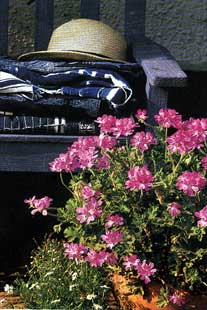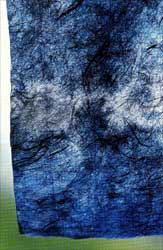 |
LEFT
Woad indigo has been used to make the paint for this garden bench
- just some of the collection of fabrics dyed by Jenny rest on top.
BELOW Natural fibres in this beautiful handmade Japanese paper create
a dark pattern when dyed.
|
|
 |
||
Indigo is insoluble, it's the oxygen that causes the chemical reactionthat turns the items blue as you pull them out of the liquid." Jenny grows a variety of traditional dye plants including red madder, yellow weld, dyer's broom and the European indigo plant, woad - in fact, the vegetable garden is now rampant with the yellow-flowers of woad, which has seeded itself widely. In the meadow behind the house, indigo-dyed fabric and sacks hang drying on the washing line. Woad was grown widely in Europe in the Middle Ages until the arrival of tropical indigo in the 17th century - woad merchants were wealthy men as woad was needed not only for the familiar blue, but also for green, purple and black in combination with other natural dyes. European woad continued to be grown in England, with the last crop being harvested in the Norfolk Fens in 1932. A synthetic method (a by-product of the petro-chemical industry) arrived this century. Woad is now enjoying a revival and the fields of England are once more glowing with its yellow flowers. It seems that the magic of indigo is contagious. Jenny has set up a business called Woadworks and distributes artists" materials, natural pigments |
for emulsion and oil-based paint made to medieval recipes in France. Jenny has confidence in the thriving revival of the industry. "A researcher at Reading University, Philip John, has discovered a method that allows indigo produced from woad to be purified by bacteriological means," she says. "This means that the dye vats can be as they were in the Middle Ages." Jenny's love of indigo shows no sign of diminishing. "I have always been hands-on, always grown indigo plants and enjoyed dyeing," she says. "I started out making jewellery and pots, but it all led to textiles, and I find that indigo and travel go hand in hand and, to me, both are addictive." Jenny Balfour-Paul's book Indigo is published by British Museum Press. It costs £29.95 but Inspirations readers can buy it at the special price of £24.95, including p&p Call 02 0 7323 123 4. Jenny is planning summer weekend courses for indigo dyeing using natural and synthetic methods, and pattern processes. For details, phone Woadworks on 01363 772104. |
|